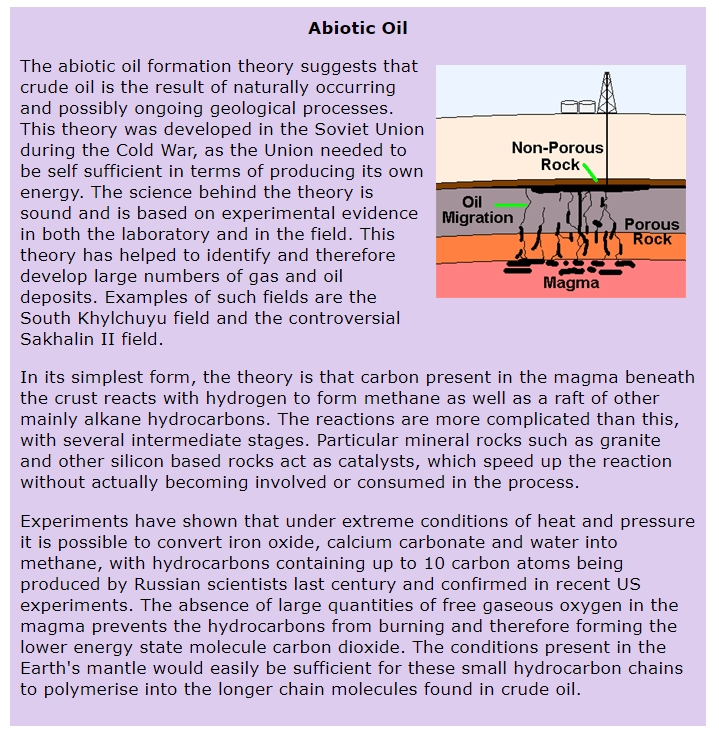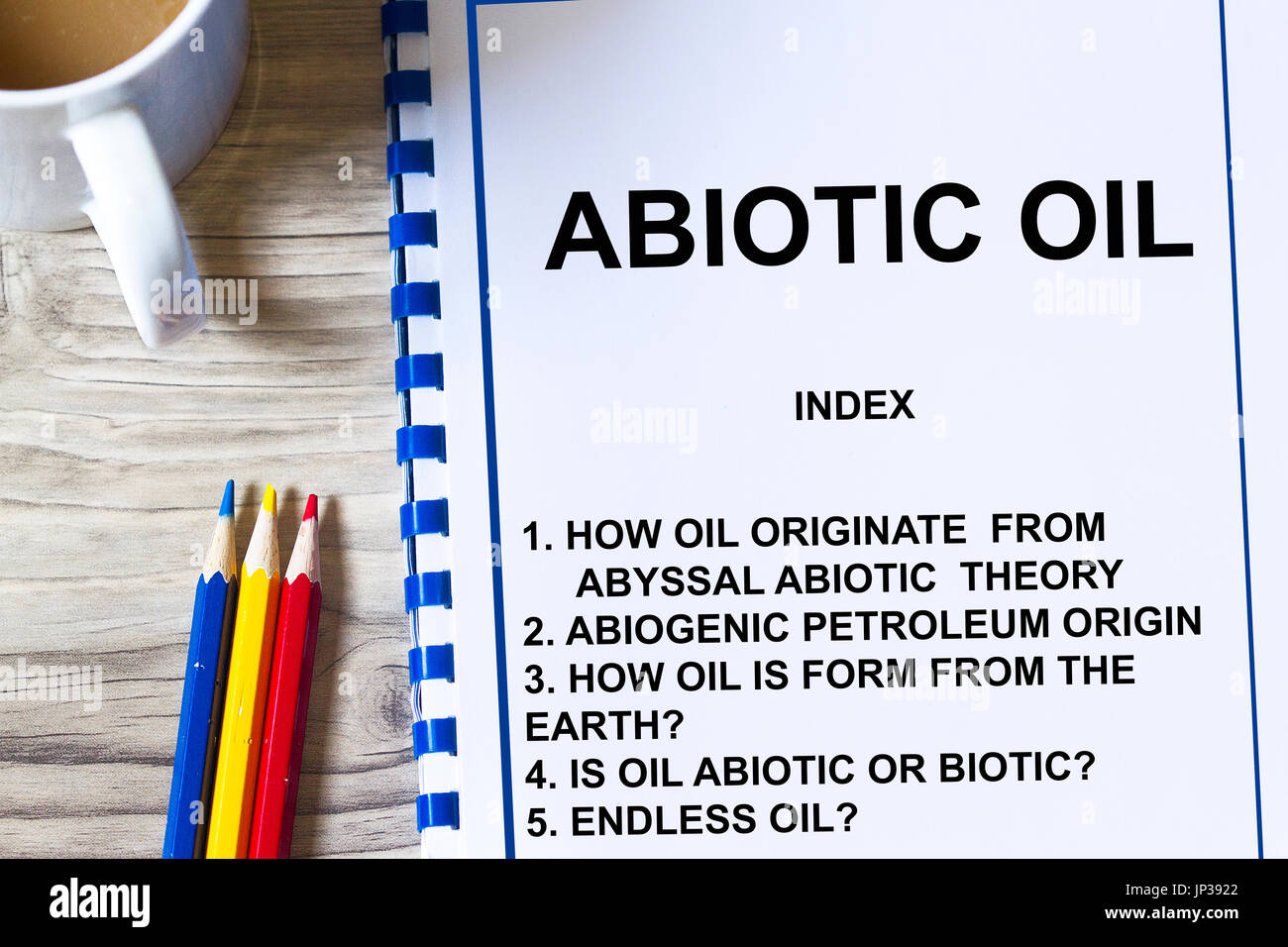abiotic oil theory
Under the so-called abiotic theory of oil finding all the energy we need is just a matter of looking beyond the traditional basins where fossils might have accumulated. That plausibility exists within very limited bounds because all of the oil weve found so far has been fossil fuel metamorphosed from ancient organic biomass.
Abiotic Oil And The Eugene Island Controversy Energy Global News
Abiotic Oil - Abiogenic Petroleum Origin.

. The abiotic oil formation theory suggests that crude oil is the result of naturally occurring and possibly ongoing geological processes. Stalin recognizing the importance of oil and recognizing also that the Soviet Union would have to be self sufficient. These hydrocarbons then migrate out of the mantle into the crust where they escape or are trapped by impermeable strata that lead to reservoir formation.
Kudryavtsev at the All-Union petroleum geology congress. This story really begins in 1946 just after the close of World War II which had illustrated quite effectively that oil was integral to waging modern mechanized warfare. Kudryavtsev analyzed the hypothesis of a biological origin of petroleum and pointed out the failures of the claims then commonly put forth to support that hypothesis.
Abiotic Oil The abiotic oil formation theory suggests that crude oil is the result of naturally occurring and possibly ongoing geological processes. Abiotic oil however might be formed from the reaction of carbonates with iron oxide and water in the region called the mantle deep in the Earth where there is a great amount of heat and pressure. There are two schools of thought among those who hold the abiotic oil theory one school thinks that replenishment is too slow to be of any use while the other claims replenishment that keeps pace with or even outpaces withdrawl.
In other words it turns the fossil-fuel paradigm upside down. Most geophysicists will agree that it is plausible for some amount of hydrocarbons to arise from natural processes. Abiogenic theory requires nothing from earths surface or the living organisms residing there.
Abiotic oil is a theory that predates the understanding of plate tectonics. According to this theory oil is not a fossil fuel at all but was formed deep in the Earths crust from inorganic materials. It was first postulated by a Russian in 1757The other theory is an abiotic one and was also postulated by a Russian albeit two centuries later.
In 1951 the modern Russian-Ukrainian theory of deep abiotic petroleum origins was first enunciated by Nikolai A. The weak abiotic oil theory. The prevailing abiotic theory is that the full complement of hydrocarbons found in oil and gas are generated in the mantle 40 to 90 miles below the surface of the earth by non-biological processes.
Abiotic oil theorists hold that oil can be derived from hydrocarbons that existed eons ago in massive pools deep within the earths core. The minerals and other raw materials involved are found within the planet and the supply of crude oil may be hardly tapped. Furthermore the mantle is such a huge reservoir that the amount of.
The abiotic oil theory goes back centuries and includes as its prominent champions Dimitri Mendeleev best known for inventing the periodic table. Petroleum is believed by most to be formed only from the remains of buried plant or animal material. Hubberts Peak by geologist Kenneth Deffeyes is a wonderful short book that concisely explains how plate tectonics formed oil and natural gas.
From what Ive read claims about rapid replenishment involve methane and light oil through fault lines in. The hypothesis of abiotic oil holds an interesting place in Earth sciences. Oil is formed at a speed sufficient to replace the oil reservoirs as we deplete them that is at a rate something like 10 000 times faster than known in.
Oil is abiotically formed at rates not higher than those that petroleum geologists assume for oil formation according to the conventional biogenic theory. Enter Abiotic Oil Theory. Stalin And Abiotic Oil.
March 5 2005. The strong abiotic theory. This theory was developed in the Soviet Union during the Cold War as the Union needed to be.
Water is generated this same way and it too is a renewable resource. Plate tectonics chemistry and geology debunk abiotic claims. Information from deep boreholes in granitic and volcanic rock of Sweden has given support to the theory of the migration of gas and oil from depth to the occurrence of isotopic fractionation in migration to an association with helium and to the presence of microbiology below 4 km depth.
This theory was developed in the Soviet Union during the Cold War as the Union needed to be. That source of hydrocarbons seeps up through the earths layers and slowly replenishes oil sources. All essential materials can be found within the earth.
There is an alternative theory about the formation of oil and gas deposits that could change estimates of potential future oil reserves. The senior geologist at the time said The overwhelming preponderance of geological evidence compels the conclusion that crude oil and natural petroleum gas have no intrinsic connection with biological matter originating near. This theory which the Russians consider a certain fact is called Abiotic Oil or rather oil that is not a- made from decaying biological organisms -biotic but from rhythmic cycles in the mantle of Earth.

Rewriting The Textbook On Fossil Fuels New Technologies Help Unravel Nature S Methane Recipes
Fossil Fuel Theory For The Origin Of Oil And Gas Debunked Oil Gas Leaks

Abiotic Oil Abiogenic Petroleum Origin Abiotic Origin Of Petroleum Abiotic Oil

Abiotic Oil What Is This Theory Christians4zionoil

How Oil Is Form Abiotic Oil Theory Concept Stock Photo Alamy

How Oil Is Form Abiotic Oil Theory Concept Stock Photo Picture And Royalty Free Image Image 82116791

Abiogenic Deep Origin Of Hydrocarbons And Oil And Gas Deposits Formation Intechopen

Abiogenic Deep Origin Of Hydrocarbons And Oil And Gas Deposits Formation Intechopen
0 Response to "abiotic oil theory"
Post a Comment